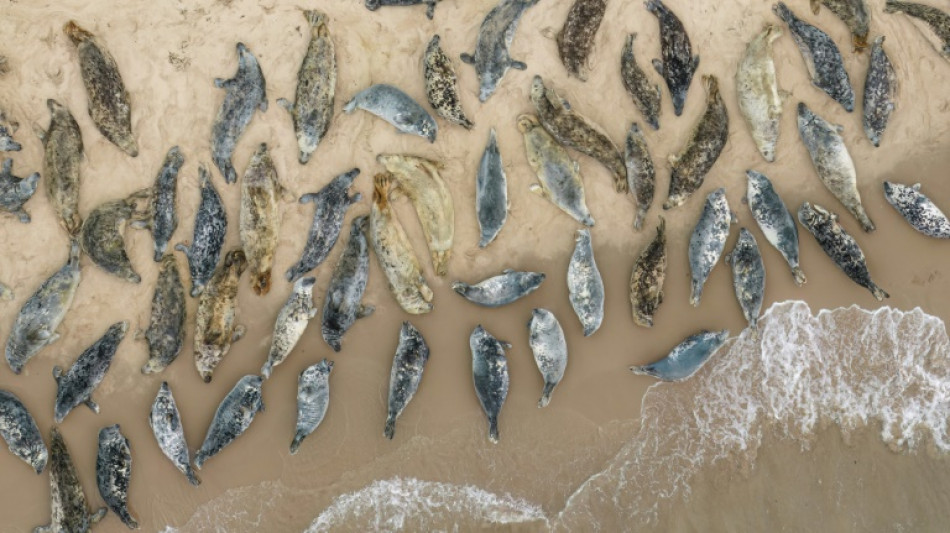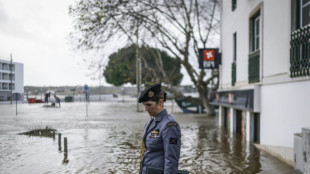
-
 German exports to US plunge as tariffs exact heavy cost
German exports to US plunge as tariffs exact heavy cost
-
Portugal heads for presidential vote, fretting over storms and far-right

-
 Suicide blast at Islamabad mosque kills at least 30, wounds over 130: police
Suicide blast at Islamabad mosque kills at least 30, wounds over 130: police
-
Russia says Kyiv behind Moscow shooting of army general

-
 Greenland villagers focus on 'normal life' amid stress of US threat
Greenland villagers focus on 'normal life' amid stress of US threat
-
Iran, US hold talks in Oman after Trump military threats

-
 Stocks waver as tech worries build
Stocks waver as tech worries build
-
Dupont, Jalibert click to give France extra spark in Six Nations bid

-
 'Excited' Scots out to prove they deserve T20 World Cup call-up
'Excited' Scots out to prove they deserve T20 World Cup call-up
-
EU tells TikTok to change 'addictive' design

-
 India captain admits 'there will be nerves' at home T20 World Cup
India captain admits 'there will be nerves' at home T20 World Cup
-
Stellantis takes massive hit for 'overestimation' of EV shift

-
 'Mona's Eyes': how an obscure French art historian swept the globe
'Mona's Eyes': how an obscure French art historian swept the globe
-
Iran, US hold talks in Oman

-
 Iran, US hold talks in Oman after deadly protest crackdown
Iran, US hold talks in Oman after deadly protest crackdown
-
In Finland's forests, soldiers re-learn how to lay anti-personnel mines

-
 Israeli president visits Australia after Bondi Beach attack
Israeli president visits Australia after Bondi Beach attack
-
In Dakar fishing village, surfing entices girls back to school

-
 Lakers rally to beat Sixers despite Doncic injury
Lakers rally to beat Sixers despite Doncic injury
-
Russian pensioners turn to soup kitchen as war economy stutters

-
 Japan taps Meta to help search for abuse of Olympic athletes
Japan taps Meta to help search for abuse of Olympic athletes
-
As Estonia schools phase out Russian, many families struggle

-
 Toyota names new CEO, hikes profit forecasts
Toyota names new CEO, hikes profit forecasts
-
Next in Putin's sights? Estonia town stuck between two worlds

-
 Family of US news anchor's missing mother renews plea to kidnappers
Family of US news anchor's missing mother renews plea to kidnappers
-
Spin woes, injury and poor form dog Australia for T20 World Cup

-
 Japan's Liberal Democratic Party: an election bulldozer
Japan's Liberal Democratic Party: an election bulldozer
-
Hazlewood out of T20 World Cup in fresh blow to Australia

-
 Japan scouring social media 24 hours a day for abuse of Olympic athletes
Japan scouring social media 24 hours a day for abuse of Olympic athletes
-
Bangladesh Islamist leader seeks power in post-uprising vote

-
 Rams' Stafford named NFL's Most Valuable Player
Rams' Stafford named NFL's Most Valuable Player
-
Japan to restart world's biggest nuclear plant

-
 Japan's Sanae Takaichi: Iron Lady 2.0 hopes for election boost
Japan's Sanae Takaichi: Iron Lady 2.0 hopes for election boost
-
Italy set for 2026 Winter Olympics opening ceremony

-
 Hong Kong to sentence media mogul Jimmy Lai on Monday
Hong Kong to sentence media mogul Jimmy Lai on Monday
-
Pressure on Townsend as Scots face Italy in Six Nations

-
 Taiwan's political standoff stalls $40 bn defence plan
Taiwan's political standoff stalls $40 bn defence plan
-
Inter eyeing chance to put pressure on title rivals Milan

-
 Arbeloa's Real Madrid seeking consistency over magic
Arbeloa's Real Madrid seeking consistency over magic
-
Dortmund dare to dream as Bayern's title march falters

-
 PSG brace for tough run as 'strange' Marseille come to town
PSG brace for tough run as 'strange' Marseille come to town
-
Japan PM wins Trump backing ahead of snap election

-
 AI tools fabricate Epstein images 'in seconds,' study says
AI tools fabricate Epstein images 'in seconds,' study says
-
Asian markets extend global retreat as tech worries build

-
 Sells like teen spirit? Cobain's 'Nevermind' guitar up for sale
Sells like teen spirit? Cobain's 'Nevermind' guitar up for sale
-
Thailand votes after three prime ministers in two years

-
 UK royal finances in spotlight after Andrew's downfall
UK royal finances in spotlight after Andrew's downfall
-
Diplomatic shift and elections see Armenia battle Russian disinformation

-
 Undercover probe finds Australian pubs short-pouring beer
Undercover probe finds Australian pubs short-pouring beer
-
Epstein fallout triggers resignations, probes


In Quebec, seal hunters want public to see practice in new light
At the helm of his motorboat, with the wind whipping and the waves crashing, Canadian seal hunter and photographer Yoanis Menge scans the horizon.
From the port of Grosse-Ile, the northern tip of the tiny Magdalen islands archipelago in the Gulf of Saint Lawrence, he spots a group of seals sunning themselves on a sandbar.
But at the slightest noise, they move. Once in the water, hunting them is much harder. From the boat, only their little black heads stick out -- quite a narrow target.
This time, Menge and his crew complete the kill from the sandbar, shooting the seals. They skin the animals and cut them apart, saving the parts they want to keep.
Menge knows seal hunting is a controversial practice, but he says it is also an ancestral tradition for the people of the Magdalen islands and several Indigenous groups in Canada, including the Inuit.
In the islands, where seal hunting is possible year-round, on the ice or on the water, Menge and others hope to rehabilitate the image of the hunt, with the support of fishermen who are worried about dwindling fish stocks.
"Here, we live with the seals -- we don't just hunt them," says Menge, who welcomed an AFP team on a hunt in late May.
"What prompted the United States or Europe to ban seal products? These are sentimental reasons. It is the only animal boycotted for sentimental reasons."
- 'Murderers' -
Any discussion of seal hunting in the Magdalen islands inevitably comes back to the image of French movie star and animal rights activist Brigitte Bardot, who in the 1970s posed on the ice floe next to baby harp seals.
Over the years, activists have particularly objected to the clubbing of the animals.
"We were treated as savages, barbarians and murderers," recalls Gil Theriault, director of the Intra-Quebec Sealers Association.
"These insults have done us a lot of harm in the public sphere. It was an attack on our way of life," he said.
Since the 1970s, the hunt has been on the wane.
On Canada's Atlantic coast, there are gray, harp, harbor, bearded, hooded and ringed seals. Commercial hunting mainly targets the first two species.
During the 1950s and 1960s, hunters could make money from the pups' white coats, highly sought after by the fashion industry. That practice was banned in 1987.
And little by little, the doors have been closing.
The United States has banned seal products since 1972. And in 2010, the European Union imposed an embargo because of hunting methods that were deemed too cruel -- a blow for the industry, which lost 30 percent of its customers.
Today, seals are mostly hunted locally for their meat, which is served in some high-end restaurants across Quebec.
But some hope to revive interest in what Magdalen islands butcher Rejean Vigneau calls an "incredible" meat.
Vigneau makes about 15 different products from seal meat, from sausages to terrines.
"It's a local meat, without hormones, very rich in iron, lean, excellent for your health," said Vigneau, who is one of only a few dozen hunters still active in the islands, down from hundreds a few decades ago.
"It's surprising that it's still frowned upon."
- 'We have a problem' -
Some of the remaining hunters now dream of bolstering their ranks, pointing out that the seal has few natural predators, and without humans hunting them, their populations grow rapidly.
They also feed on all kinds of fish -- an adult swallows several kilos a day. That is a drain on the main source of revenue for island dwellers.
"In the Gulf, given the number of gray seals and their consumption of fish... we have a problem. Fish stocks are not going up," said fisherman Ghislain Cyr.
Simon Nadeau, a marine mammals expert with the Canadian Department of Fisheries and Oceans, explains that seal populations have exploded since the 1970s.
"But we're not talking about overpopulation," he insisted.
The number of harp seals nearly quadrupled between 1970 and 2019 to an estimated 7.6 million, according to government data.
In the Gulf of Saint Lawrence, the gray seal population increased from 5,000 in 1960 to 44,000 animals in 2017.
At the same time, fish stocks in the Atlantic Ocean off Canada are at their lowest levels on record.
For Nadeau, the two are not so easily linked, in particular because the entire ecosystem has been altered in recent decades due to global warming and overfishing.
"Seals may have contributed to the decline of fish stocks, but they did not cause it," he said, while acknowledging that they are one of the factors that prevent certain fish populations from bouncing back.
X.Habash--SF-PST



